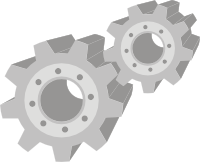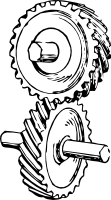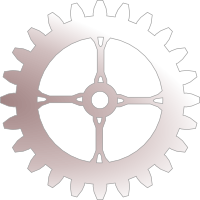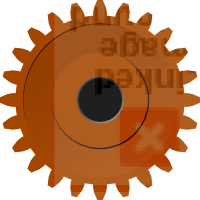Associations to the word «Gear»
Noun
- Propeller
- Turbine
- Screw
- Rack
- Reduction
- Hub
- Gearbox
- Skid
- Gopher
- Strut
- Landing
- Barre
- Graft
- Monoplane
- Steering
- Grasshopper
- Cockpit
- Microorganism
- Groundwater
- Gorilla
- Lever
- Torque
- Axle
- Valve
- Clutch
- Fowl
- Fuselage
- Clarkson
- Gull
- Grassland
- Greenhouse
- Tractor
- Brake
- Chips
- Configuration
- Teen
- Biplane
- Throttle
- Ratio
- Wheel
- Flap
- Transmission
- Grinding
- Rotor
- Shaft
- Piston
- Takeoff
- Stephenson
- Rudder
- Catapult
- Windshield
- Mesh
- Selector
- Cylinder
- Samsung
- Goose
- Engine
- Camping
- Reef
- Gear
- Decay
- Runway
- Bearing
- Hormone
- Grape
- Generator
- Rpm
Adjective
Pictures for the word «Gear»
Wiktionary
GEAR, noun. (uncountable) equipment or paraphernalia, especially that used for an athletic endeavor.
GEAR, noun. Clothing; garments.
GEAR, noun. (obsolete) Goods; property; household items.
GEAR, noun. (countable) a wheel with grooves (teeth) engraved on the outer circumference, such that two such devices can interlock and convey motion from one to the other.
GEAR, noun. (countable) a particular combination or choice of interlocking gears, such that a particular gear ratio is achieved.
GEAR, noun. (countable) A configuration of the transmission of a motor car so as to achieve a particular ratio of engine to axle torque
GEAR, noun. (slang) recreational drugs
GEAR, noun. (uncountable) (archaic) stuff.
GEAR, noun. (obsolete) Business matters; affairs; concern.
GEAR, noun. (obsolete) (UK) (dialect) Anything worthless; nonsense; rubbish.
GEAR, verb. (engineering) (transitive) To provide with gearing; to fit with gears in order to achieve a desired gear ratio.
GEAR, verb. (engineering) (intransitive) To be in, or come into, gear.
GEAR, verb. To dress; to put gear on; to harness.
GEAR, adjective. (mostly British (Scouse)) great or fantastic
GEAR CASE, noun. An enclosure for the bicycle chain and sprocket assemblages commonly employed by utility bicycles. It protects the chain from mud and dirt and may also contain an oil bath to keep the chain lubricated.
GEAR CASES, noun. Plural of gear case
GEAR CHANGE, noun. A mechanism which changes gears in a car.
GEAR CHANGES, noun. Plural of gear change
GEAR DOWN, verb. To arrange a system of gear wheels or pulleys etc such that the driven part rotates or moves slower than the driving part
GEAR HEAD, noun. Alternative spelling of gearhead
GEAR HEADS, noun. Plural of gear head
GEAR LEVER, noun. (British) The lever used to change gears in a motor car. Called gear shift in the US and Canada.
GEAR LEVERS, noun. Plural of gear lever
GEAR OIL, noun. A high-viscosity lubricant intended for use on transmissions, transfer cases, and differentials in automobiles etc.
GEAR RATIO, noun. The ratio of the speeds of rotation of the initial and final gears in a gear train.
GEAR RATIOS, noun. Plural of gear ratio
GEAR SHIFT, noun. That part of a gearbox involved in changing gear; includes the gear lever and the forks attached to it.
GEAR SHIFTS, noun. Plural of gear shift
GEAR STICK, noun. Alternative spelling of gearstick
GEAR STICKS, noun. Plural of gear stick
GEAR TRAIN, noun. A system of interconnected gears.
GEAR TRAINS, noun. Plural of gear train
GEAR UP, verb. (idiomatic) To prepare for an activity.
GEAR WHEEL, noun. A wheel with a toothed rim, intended to engage with others, or similar equipment, to form a gear
GEAR WHEELS, noun. Plural of gear wheel
Dictionary definition
GEAR, noun. A toothed wheel that engages another toothed mechanism in order to change the speed or direction of transmitted motion.
GEAR, noun. Wheelwork consisting of a connected set of rotating gears by which force is transmitted or motion or torque is changed; "the fool got his tie caught in the geartrain".
GEAR, noun. A mechanism for transmitting motion for some specific purpose (as the steering gear of a vehicle).
GEAR, noun. Equipment consisting of miscellaneous articles needed for a particular operation or sport etc..
GEAR, verb. Set the level or character of; "She pitched her speech to the teenagers in the audience".
Wise words
Kind words can be short and easy to speak, but their echoes
are truly endless.











